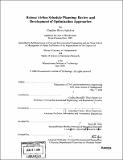| dc.contributor.advisor | Cynthia Barnhart and John-Paul Clarke. | en_US |
| dc.contributor.author | Agbokou, Claudine Biova, 1979- | en_US |
| dc.contributor.other | Massachusetts Institute of Technology. Operations Research Center. | en_US |
| dc.date.accessioned | 2006-03-24T18:23:28Z | |
| dc.date.available | 2006-03-24T18:23:28Z | |
| dc.date.copyright | 2004 | en_US |
| dc.date.issued | 2004 | en_US |
| dc.identifier.uri | http://hdl.handle.net/1721.1/30143 | |
| dc.description | Thesis (S.M.)--Massachusetts Institute of Technology, Dept. of Civil and Environmental Engineering; and, (S.M.)--Massachusetts Institute of Technology, Operations Research Center, 2004. | en_US |
| dc.description | Includes bibliographical references (p. 87-89). | en_US |
| dc.description.abstract | Major airlines aim to generate schedules that maximize profit potential and satisfy constraints involving flight schedule design, fleet assignment, aircraft maintenance routing and crew scheduling. Almost all aircraft and crew schedule optimization models assume that flights, aircraft, crews, and passengers operate as planned. Thus, airlines typically construct plans that maximize revenue or minimize cost based on the assumption that every flight departs and arrives as planned. Because flight delays and cancellations result from numerous causes, including severe weather conditions, unexpected aircraft and crew failures, and congestion at the airport and in the airspace, this deterministic, optimistic scenario rarely, if ever, occurs. In fact, schedule plans are frequently disrupted and airlines often incur significant costs in addition to those originally planned. To address this issue, an approach is to design schedules that are robust to schedule disruptions and attempt to minimize realized, and not planned, costs. In this research, we review recovery approaches and robustness criteria in the context of airline schedule planning. We suggest new approaches for designing fleet assignments that facilitate recovery operations, and we present models to generate plans that allow for more robust crew operations, based on the idea of critical crew connections. We also examine the impact on robustness of new scheduling practices to debank hub airports. | en_US |
| dc.description.statementofresponsibility | by Claudine Biova Agbokou. | en_US |
| dc.format.extent | 89 p. | en_US |
| dc.format.extent | 3114316 bytes | |
| dc.format.extent | 3114123 bytes | |
| dc.format.mimetype | application/pdf | |
| dc.format.mimetype | application/pdf | |
| dc.language.iso | eng | en_US |
| dc.publisher | Massachusetts Institute of Technology | en_US |
| dc.rights | M.I.T. theses are protected by copyright. They may be viewed from this source for any purpose, but reproduction or distribution in any format is prohibited without written permission. See provided URL for inquiries about permission. | en_US |
| dc.rights.uri | http://dspace.mit.edu/handle/1721.1/7582 | |
| dc.subject | Civil and Environmental Engineering. | en_US |
| dc.subject | Operations Research Center. | en_US |
| dc.title | Robust airline schedule planning : review and development of optimization approaches | en_US |
| dc.type | Thesis | en_US |
| dc.description.degree | S.M. | en_US |
| dc.contributor.department | Massachusetts Institute of Technology. Department of Civil and Environmental Engineering | |
| dc.contributor.department | Massachusetts Institute of Technology. Operations Research Center | |
| dc.identifier.oclc | 56017873 | en_US |
